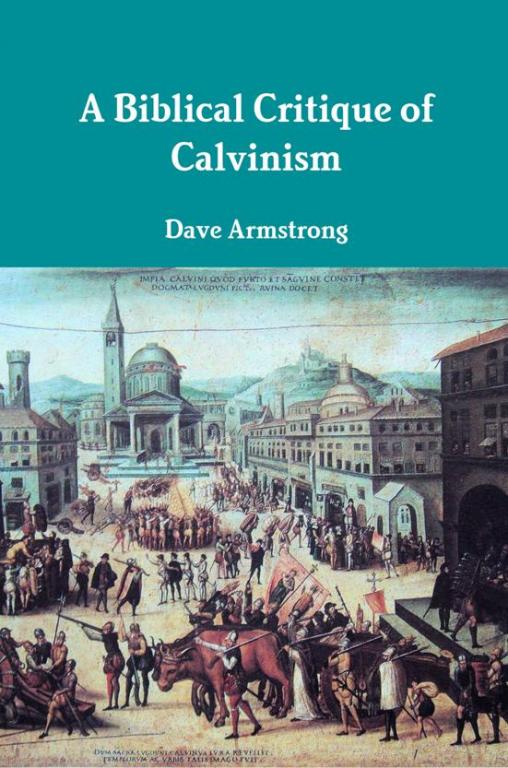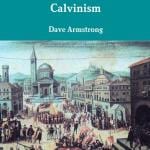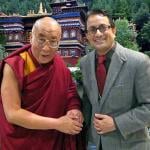
[excerpt from my book, A Biblical Critique of Calvinism (Oct. 2012, 178p), pp. 87-95. Follow the link for content and purchase information]
***
I’ll be using, the (public domain) translation of Institutes of the Christian Religion by Henry Beveridge, produced for the Calvin Translation Society in 1845, from the 1559 edition in Latin; reprinted by William B. Eerdmans Publishing Company (Grand Rapids, Michigan), 1995, and available online at the wonderful Christian Classics Ethereal Library site. My own Bible passages are from RSV. Calvin’s words will be in blue.
***
It may be proper here more particularly to attend to the subtleties which superstition employs. In revolting to strange gods, it avoids the appearance of abandoning the Supreme God, or reducing him to the same rank with others. It gives him the highest place, but at the same time surrounds him with a tribe of minor deities, among whom it portions out his peculiar offices. In this way, though in a dissembling and crafty manner, the glory of the Godhead is dissected, and not allowed to remain entire. In the same way the people of old, both Jews and Gentiles, placed an immense crowd in subordination to the father and ruler of the gods, and gave them, according to their rank, to share with the supreme God in the government of heaven and earth. In the same way, too, for some ages past, departed saints have been exalted to partnership with God, to be worshipped, invoked, and lauded in his stead. (I, 12:1)
For it is plain that the worship which Papists pay to saints differs in no respect from the worship of God: for this worship is paid without distinction; only when they are pressed they have recourse to the evasion, that what belongs to God is kept unimpaired, because they leave him λατρια. [latreia] (I, 12:2)
Calvin neglects to see that the Bible often refers to honor given to notable or saintly human beings (and gives no hint whatsoever that this detracts from adoration and worship of God). This is an analogy to Catholic veneration. We seek (and are commanded) to imitate or emulate the saints as holy models (1 Tim 4:12; Heb 6:12; 13:7; Jas 5:10-11; 1 Pet 5:3), just as St. Paul repeatedly urged imitation of himself (Rom 11:14; 1 Cor 4:15-16; 11:1-2; Phil 3:17; 4:9; 1 Thess 1:6-7; 2 Thess 3:7-9; 2 Tim 3:10-14).
Honor is a widespread New Testament motif (Rom 12:10). We are to honor our parents (Eph 6:2), widows (1 Tim 5:3), elders (priests or bishops) in the Church (1 Tim 5:17), all men), and the emperor (1 Pet 2:17). King Asa and King Hezekiah were both honored after their deaths:
2 Chronicles 16:14 They buried him in the tomb which he had hewn out for himself in the city of David. They laid him on a bier which had been filled with various kinds of spices prepared by the perfumer’s art; and they made a very great fire in his honor. (cf. 21:19, showing that this was a general practice)
2 Chronicles 32:33 And Hezeki’ah slept with his fathers, and they buried him in the ascent of the tombs of the sons of David; and all Judah and the inhabitants of Jerusalem did him honor at his death.
How is it, then, that Calvin thinks we cannot honor and venerate fellow human saints, because they are dead, and since this allegedly is invariably identical (in the minds of those doing it) to worship of God (i.e., idolatry and replacement of what belongs to God alone)? Just because these men no longer walk the earth, it doesn’t follow at all (per Hebrews 11) that they are no longer worthy of honor and veneration.
St. Paul makes it clear that imitating him is in complete harmony with the notion of imitating Christ, whom Paul is imitating (see, e.g., Eph 5:1: “Therefore be imitators of God, as beloved children:): “Be imitators of me, as I am of Christ” (1 Cor 11:1); “And you became imitators of us and of the Lord . . .” (1 Thess 1:6).
It’s not an “either/or” scenario in the Bible. But in Calvin’s mind, it is. He clearly is not thinking biblically when it comes to veneration of saints. He refuses to make necessary distinctions, and collapses categories together that are clearly separated in the Bible and in Catholic theology.
When Christ repels Satan’s insulting proposal with the words, “It is written, Thou shalt worship the Lord thy God, and him only shalt thou serve,” (Mt. 4:10), there was no question of λατρια [latreia]. For all that Satan asked was προσκὺνεσις (obeisance). In like manners when John is rebuked by the angel for falling on his knees before him (Rev. 19:10; 22:8, 9), we ought not to suppose that John had so far forgotten himself as to have intended to transfer the honour due to God alone to an angel. But because it was impossible that a worship connected with religion should not savour somewhat of divine worship, he could not προσκὺνει̑ν (do obeisance to) the angel without derogating from the glory of God. True, we often read that men were worshipped; but that was, if I may so speak, civil honour. The case is different with religious honour, which, the moment it is conjoined with worship, carries profanation of the divine honour along with it. (I, 12:3)
We are not to – must not! — adore and worship anyone but God. This is what the Catholic Church has always taught. But we can and should also honor and venerate saints and angels. No one need merely take our word on that. A clear indication of this in Holy Scripture is Joshua’s veneration of the angel who commanded the Lord’s army:
Joshua 5:13-15 When Joshua was by Jericho, he lifted up his eyes and looked, and behold, a man stood before him with his drawn sword in his hand; and Joshua went to him and said to him, “Are you for us, or for our adversaries?” [14] And he said, “No; but as commander of the army of the LORD I have now come.” And Joshua fell on his face to the earth, and worshiped [shachah], and said to him, “What does my lord bid his servant?” [15] And the commander of the LORD’s army said to Joshua, “Put off your shoes from your feet; for the place where you stand is holy.” And Joshua did so.
This Hebrew word shachah (Strong’s word #7812) is translated 99 times in the King James Version (according to Young’s Concordance) as “worship” in the Old Testament, including passages that refer to exclusive worship of God:
Exodus 34:14 (for you shall worship [shachah] no other god, for the LORD, whose name is Jealous, is a jealous God),
But it also can refer to bowing or crouching (53 instances), obeisance (nine times), and prostration (four examples). Thus, here it is applied to the veneration of an angel, with no disapproval in the inspired text.
This goes beyond even the Catholic distinction between dulia and latreia, that Calvin roundly mocks as absurd, since the same word is applied to fundamentally different actions: thus potentially leading to far more confusion than Calvin thinks Catholic distinctions of words and actions lead to. Why, then, does he not go after the inspired Bible writers with the same vehemence that he reserves for his anti-Catholic zeal?
Moreover, “worship” is used in a wider (literary) sense of showing reverence or obeisance to men of authority (in this instance, a king), in the following passage (in KJV, for illustration):
1 Chronicles 29:20 And David said to all the congregation, Now bless the LORD your God. And all the congregation blessed the LORD God of their fathers, and bowed down their heads, and worshipped [shachah] the LORD, and the king.
The RSV has: “worshiped the LORD, and did obeisance to the king,” but it is one Hebrew word applied to both. A similar passage to Joshua 5:13-15 occurs with a different Hebrew word, qadad (Strong’s #6915):
Numbers 22:31 Then the LORD opened the eyes of Balaam, and he saw the angel of the LORD standing in the way, with his drawn sword in his hand; and he bowed [qadad] his head, and fell on his face.
Like schachah, this word can also denote veneration or reverence of creatures (see, e.g., 1 Sam 24:8; 1 Ki 1:16, 31: obeisance to the king), while at the same time it can be applied to worship or adoration of God, in the same outward gesture of bowing down before Him:
Exodus 12:27 you shall say, `It is the sacrifice of the LORD’s passover, for he passed over the houses of the people of Israel in Egypt, when he slew the Egyptians but spared our houses.'” And the people bowed [qadad] their heads and worshiped [shachah].
Exodus 34:8 And Moses made haste to bow [qadad] his head toward the earth, and worshiped [shachah].
In fact, King Saul venerated [both shachah and qadad] – and talked to — the prophet Samuel after his death:
1 Samuel 28:14 . . . And Saul knew that it was Samuel, and he bowed [qadad] with his face to the ground, and did obeisance [shachah].
This is almost the most explicit conceivable biblical evidence (from Hebrew words and what is described in the passage) for veneration of creatures that can be imagined. He is venerating a dead prophet (not even an angel this time), and the two Hebrew words used to describe what he did are both applied many times to adoration of God.
Now, Calvin is fond of regarding purely Old Testament arguments as antiquated and of no import in the Christian age. Therefore, to persuade Calvinists of the force of this argument, we (preferably) need to find a corresponding or analogous New Testament linguistic argument, having to do with the veneration / worship question. Some indication exists, that this is the case.
One relevant Greek word along these lines is pipto (Strong’s word #4098). It means, literally, “fell” or “fall down”. We see many instances where it is applied (as a reverent gesture) to divine adoration or worship of God (proskuneo is Greek for “worship”: Strong’s #4352):
Matthew 2:11 and going into the house they saw the child with Mary his mother, and they fell down [pipto] and worshiped [proskuneo] him. . . .
Matthew 17:5-6 He was still speaking, when lo, a bright cloud overshadowed them, and a voice from the cloud said, “This is my beloved Son, with whom I am well pleased; listen to him.” [6] When the disciples heard this, they fell [pipto] on their faces, and were filled with awe.
1 Corinthians 14:25 . . . falling [pipto] on his face, he will worship [proskuneo] God . . .
Revelation 4:10 the twenty-four elders fall down [pipto] before him who is seated on the throne and worship [proskuneo] him who lives for ever and ever . . .
Revelation 5:8 . . . the four living creatures and the twenty-four elders fell down [pipto] before the Lamb . . .
Revelation 5:14 And the four living creatures said, “Amen!” and the elders fell down [pipto] and worshiped [proskuneo]. [the “Lamb”: 5:13]
Revelation 11:16 And the twenty-four elders who sit on their thrones before God fell [pipto] on their faces and worshiped [proskuneo] God,
Calvin brought up (I, 12:3) the passages about St. John being “rebuked by the angel for falling on his knees before him (Rev. 19:10; 22:8, 9)” as a counter-argument against generation of saints. Likewise, we can note the related passage of Acts 10:25, where St. Peter discourages Cornelius from worshiping him, since he is a man. All three of those passages contain both pipto and proskuneo. Calvin also argued in another chapter:
[T]here is nothing to which we are more prone than to prostrate ourselves before them in stupid adoration, and then ascribe to them the blessings which we owe to God alone. Even John confesses in the Apocalypse (Rev. 19:10; 22:8, 9), that this was his own case, but he immediately adds the answer which was given to him, “See thou do it not; I am thy fellow servant: worship God.” (I, 14:10)
Here is a New Testament text with a related word (prospipto), having to do with the jailer, after Paul and Silas prayed in prison and an earthquake resulted:
Acts 16:29 . . . trembling with fear he fell down before [prospipto] Paul and Silas,
As in the verses above, we observe both fear and falling down, but (quite interestingly) there is no rebuke or clarification from Paul and Silas that they were but men. Proskuneo doesn’t appear (the word that would prove it was attempted worship or adoration). This is, then, arguably an instance of veneration of Paul and Silas, due to the supernatural event that showed them to be very special men.
Another passage with a different word used, implies possible veneration of an angel:
Luke 24:4-5 While they were perplexed about this, behold, two men stood by them in dazzling apparel; [5] and as they were frightened and bowed [klino] their faces to the ground . . .
Both fear and a bowing or prostrating gesture are, in the Bible, presented as characteristic in encounters with angels. Once again, proskuneo is not present in the passage, and here, as in Acts 16:29, the women were not told to get up, as if they had done anything improper. This is (arguably, plausibly) because they were venerating the angel and not adoring or worshiping, which would be impermissible.
We thus can rightly conclude, in light of all these fascinating passages, that God (unlike Calvin) doesn’t seem to think that human beings are so breathtakingly stupid and ignorant that they can’t (or very often cannot) tell the difference between creatures and God, or between veneration and adoration / worship.
Therefore, He didn’t see fit (in inspiring those who wrote his revelation to man) to even bother to use a different word for the two in Hebrew; and even in the New Testament, the gesture (falling down) was no different for veneration than it was for adoration. According to Calvin, this causes confusion and idolatry, but according to Catholicism and the Bible, people generally have enough discernment to know the difference between the two.
The dichotomy that God is concerned about is between the true God (Himself) and false gods (as represented by material idols); not between veneration (where it is properly due) and worship reserved for Him alone: as if the former is completely forbidden and wicked.
Calvin (agreeing with the Catholic Church) rightly condemns the detestable idolatry of worshiping false gods, but his mistake is to equate altogether permissible biblical veneration with this rank idolatry of serving other “gods” beside the one true One. This is one of the fundamental errors of the so-called Protestant “Reformation,” and we see how completely false and unbiblical it is.
God knew what He was doing. I submit that John Calvin often did not, and the sad thing is that his erroneous teachings (which aren’t all of them, but a great number) have led millions of souls into various dangerous theological and spiritual errors and deprived them of spiritual aids and beliefs (such as veneration of saints and angels) that could have helped them to become closer to God and to better withstand the world, the flesh, and the devil.
***













